
Merchandise Of The Fool
Gambling is one of the major prohibitions and it is not a minor sin. The door is wide open before a Muslim to earn money through lawful means. Hence, he should not let others beguile him or deceive him with baseless ideas. Rather, he should be more realistic.
A Muslim is ordered by Allah to leave no stone un turned in seeking his livelihood through the sweat of his labor. In earning his living a Muslim should employ his thinking, exert physical effort to attain his goal, and burn his midnight oil to make his dreams and high hopes come true.
We can not expect a Muslim to earn his living by a stroke of luck while wallowing in deep slumber and exerting no effort. Lacking behind and lassitude are not the characteristics of a Muslim and not the norms of Islam.
Our Muslim youth should not be beguiled by such fake and illegal ambitions. Rather, they should live the reality as it is and be down-to-earth.
Referring to this in his sincere advice to his son Al-Hasan, Imam `Ali (may Allah be pleased with him) stated, ‘Do not incline to hopes (i.e., while staying idle), because high hopes is the merchandise of the fool.’ This also reminds us with the words of a poet: Never be the slave of hopes as hopes are the capitals of the penniless!”
Yusuf Al Qaradawi
Always Say That Which Is Best
Al-Isra (The Ascension) Sura 17: Verse 53
Tell My servants (O Muhammad), to always say that which is best. Verily it is Satan who sows discord among men. Satan indeed is an open enemy to man.
In their discussions with the unbelievers and polytheists, in fact with all opponents of their faith, Muslims should refrain from losing their temper. Additionally, they should not resort to exaggerated and extremist statements. Even in the face of provocation from their opponents, Muslims should not utter even a word that is contrary to the truth; nor should they lose their temper at the vulgarities which are flung at them by their opponents, nor should they be provoked to the point of paying back their opponents in the latter’s own coins. Instead, they should keep their composure and say only that which is balanced and true, and is in keeping with the grace and dignity of the faith which they seek to uphold.
The Quran tells believers that whenever in the course of their discussion on contentious issues with unbelievers, they feel overly provoked and overwhelmed with rage, they should immediately realize that such reactions are instigated by Satan who is keen to hurt the cause of their faith. Satan will certainly try to prompt the believers to give up, as their opponents had done, all efforts of reform, and to become entangled in futile wrangling and strife. For it is Satan’s aim that all mankind remain perpetually enmeshed in such controversies.
Compiled From:
“Towards Understanding the Quran” – Abul Ala Mawdudi, Vol. 5, p. 51
Durood Shareef Ki Fazeelat Hadith Ki Roshni Mein
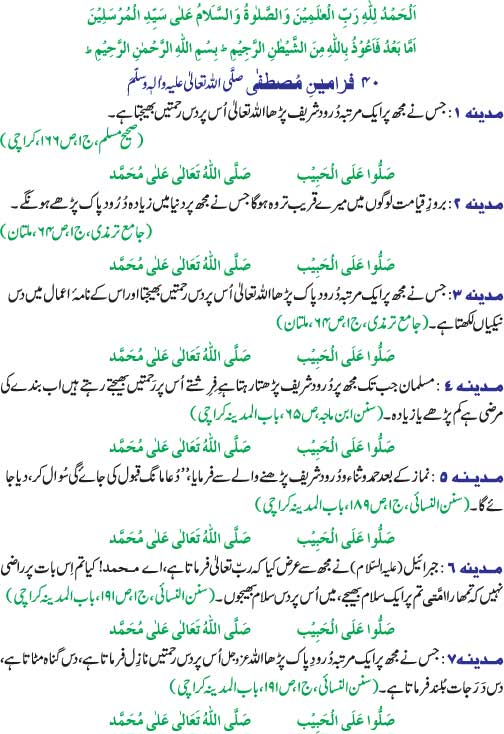
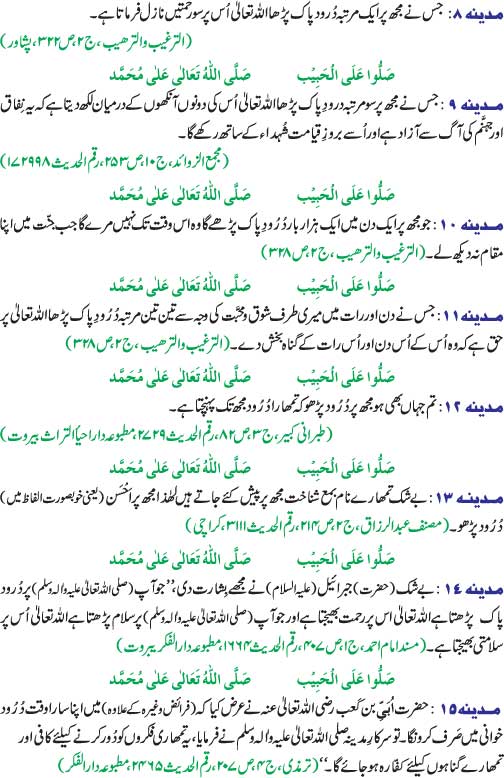
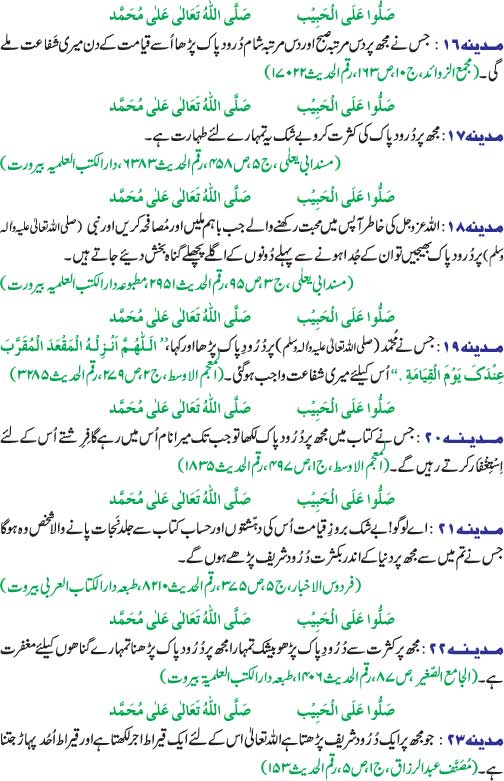
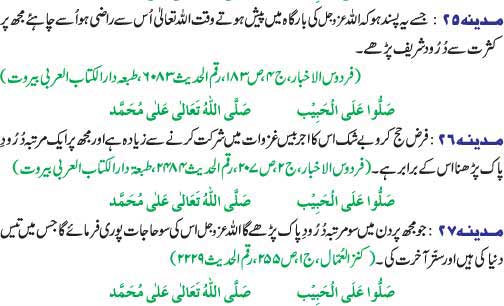
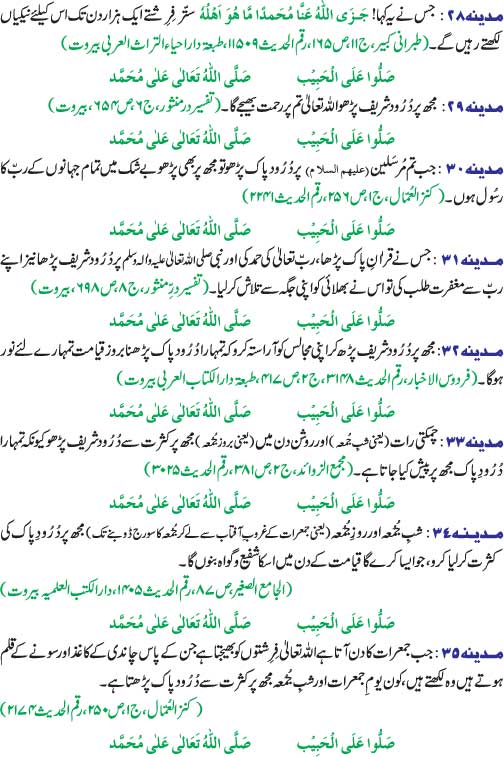
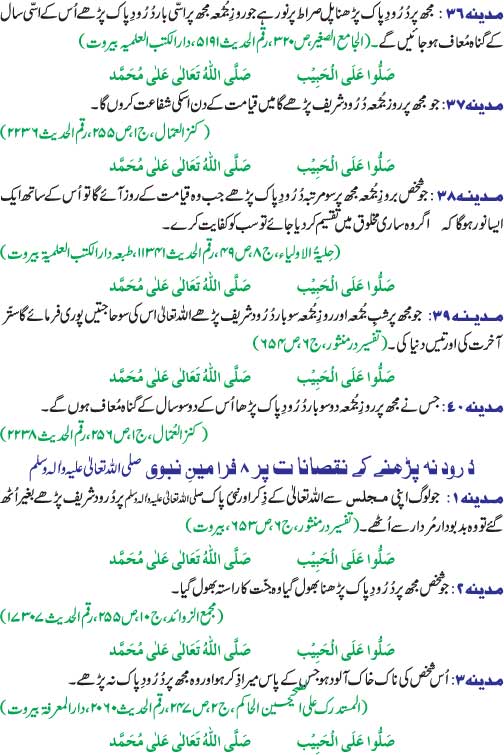
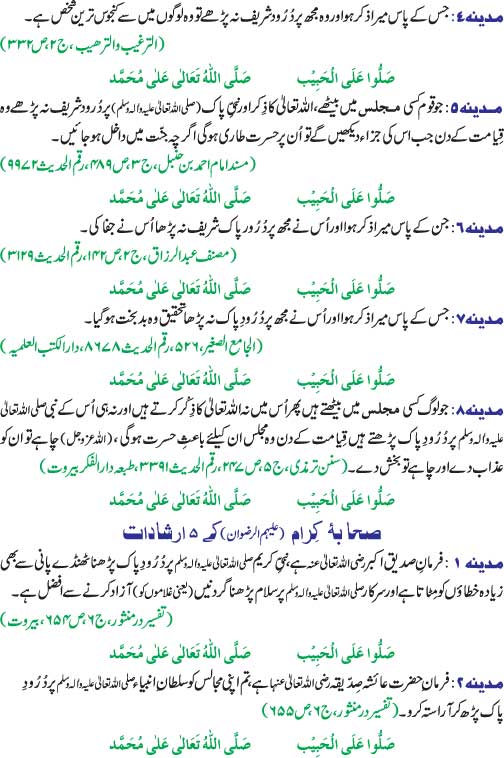
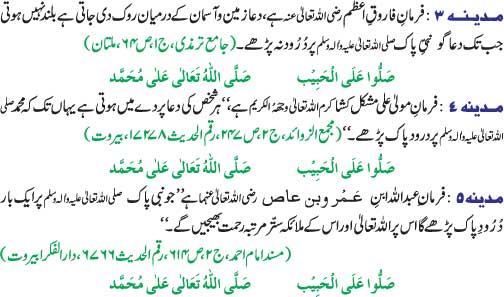
Quranic Advice
It is narrated that the Prophet (saw) has said:
One who has even a particle of pride in his heart, shall not enter paradise. (Muslim)
Pride comes when you see your
- intelligence,
- wealth,
- friends,
- influence,
- titles and
- life
as your own achievements, instead of as gifts from ALLAH, the Al-Mighty.
When you finally view them as responsibilities that you must fulfill, you will be thankful for these gifts, and be afraid that you will be unable to fulfill them. The syukur and fear (khauf) will drown away the pride.
Remember,
- you will not bring even an atom of wealth, stocks, bonds, land or property, to the grave.
- you will not bring a string of degrees or qualifications from prestigious Universities to the grave.
- you will not bring your circle of friends, powerful connections, celebrities, and peers who hail you, to your grave.
- you will not bring your beloved parents, children, spouses or relatives to the grave.
- you will not bring your fame, reputation, honor to the grave.
- you will not bring your millions of adoring fans, and admiring colleagues to the grave.
- you will not bring any of the fine clothes in your closet, nor the expensive furniture in your living room, nor the million dollar apartment you saved a lifetime to purchase, to the grave.
- you will not even be able to prevent your carefully groomed hair, face and body from rotting, eaten by worms and maggots, when you are in the grave.
So when you have died, and your body has rotted away, you will then be asked by Allah,
where is the dunya (all that you once possessed) that you so loved?
where is the dunya (all that you once possessed) that you were so proud of?
where are your supporters (the admiring fans, the loving family, the approving peers, the powerful colleagues, the people who idolized and praised you always), who worshiped you?
The grim reality sets in the….you are now as you were when you were in your mother?s womb.
Then, you were in the dark womb of your mother, completely helpless, at Allah’s mercy, and ….you had no friends, no wealth, no power, no authority, no knowledge, no property … you possessed nothing, and you were then born, in humility, naked, covered in slime… you were nothing.
Then Allah showered you with His love and guidance, and gave you a portion of this worldly life, so that you may be thankful, and grateful, and that you bow humbly in submission.
But no, Man is rebellious.
36:77. Does not man see that We have created him from Nutfah (mixed male and female discharge semen drops). Yet behold! He (stands forth) as an open opponent!
Today, once again, you are in the womb, the dark, dark womb of Mother Earth, completely helpless, at Allah’s mercy, and …. once again, you have no friends, no wealth, no power, no authority, no knowledge, no property … you possess nothing, you have come full circle.
You are waiting to stand trial, on Judgement Day, a Day when you will face Allah in humility and fear, naked, covered in sin… and you will have to account to Allah, what you did with His gifts. And if you had walked the earth with pride, today, you will truly fear Allah, but that fear will not help you. Because…
One who has even a particle of pride in his heart, shall not enter paradise. (Muslim)
Seek out your pride, and repent.
Every single atom.
Beg Allah for His Mercy and His help to cleanse your hearts.
Seek out Allah’s blessings to you, and be grateful.
Every single blessing. From being able to wake up, to being able to swallow, see, smell and walk. For the gift of health. Wealth. Education. Realisation. Happiness. Love. Rizq. Fresh air. Clean water. Food on the table. The list in endless. Only that, sometimes, we are too blind to see.
[31:18] And turn not your face away from men with pride, nor walk in insolence through the earth. Verily, Allah likes not each arrogant boaster.
Oh Mankind, Fear Allah! He Possesses the Heavens and the Earth, and all that lies in between. And, we, his creation, possess nothing. Realize, repent, and humble yourself before your Rabb.
QuranicTruth
Quran KA Paigham

Unbeliever’s Argument In Hell
What the Qur’an teachers :
Before the fire they are brought, morning and evening, and then on the Day when the Last Hour comes, it will be said: Cast Pharaoh’s people into the worst suffering. They will contend with one another in the fire: The weak will say to those who were arrogant, “We have been your followers, so can you relieve us of some share of the fire?” The arrogant will reply: “We are all in it together. For God has judged between His creatures.” Those in the fire will say to the keepers of hell: “Pray to your Lord that He lighten this suffering of ours, though it be for one day only.” They will ask: “Did your messengers not come to you with clear evidence of the truth?” They will say: “Yes, indeed.” (The keepers of hell) will say: “Pray, then!” But the prayers of the unbelievers will be all in vain.
(The Forgiving; 40: 46-50)
It describes the end suffered by Pharaoh and his people as a result of their arrogant rejection of Moses’ call on them to believe in God’s oneness. The way this verse is phrased suggests that they are brought before the fire during the time between their death and the Day of Judgment. This may be a reference to the torment suffered in the grave. The statement that follows reads: “and then on the Day when the Last Hour comes, it will be said: Cast Pharaoh’s people into the worst suffering.” This means that this suffering precedes the Day of Judgment. It is a terrible punishment involving exposure to the fire morning and evening, either to make them expect its burning and pain, which is a terrible suffering, or to experience it, which is even worse. Then, on the Day of Judgment, they will be cast into the worst suffering.
The verse that follows tells us of something that happens after resurrection. The unbelievers are shown arguing in hell: “The weak will say to those who were arrogant, ‘We have been your followers, so can you relieve us of some share of the fire?’” This means that the weak are together with the arrogant in the fire of hell. The weak have not been spared on account of their weakness, or their being driven like cattle, having no say or choice. God granted them a position of honor, which equipped them to exercise free choice and to be responsible for what they choose. They relinquished all this and followed their arrogant leaders instead. They did not object to anything the leaders said. In fact, it did not occur to them that they could object. They did not think about what their arrogant leaders said to them, or the errors they landed them in: “We have been your followers.” The fact of their relinquishing responsibility and what God granted them could never serve as extenuating circumstances in God’s sight. Therefore, they will be in hell, driven there by their leaders, just as they used to drive them like sheep in the life of this world. We see them asking their leaders: “Can you relieve us of some share of the fire?” This question is a reminder of what such leaders used to assert, pledging to protect their followers against evil and harm.
Such arrogant leaders, however, are soon fed up with their weak followers’ requests. Their answer betrays their boredom, but nonetheless they acknowledge what has happened: “We are all in it together. For God has judged between His creatures.”
“We are all in it together.” We are all weak, lacking all support and help. We are all alike. So why do you put such a question to us when you realize that the noble and the weaker elements are all the same? “God has judged between His creatures.” There can be no review or change to His judgment. The matter is settled. No creature can reduce or amend God’s judgment.
When all realize that no refuge can be sought from God’s punishment except with Him, they all humbly appeal to the guards of hell, in a way that makes them all equal: “Those in the fire will say to the keepers of hell: Pray to your Lord that He lighten this suffering of ours, though it be for one day only.”
They want the guards of hell to intercede on their behalf, hoping that their terrible ordeal can be lifted a little. They ask them to pray to God to reduce their punishment for one day, just to breathe and have a bit of rest. Even a day’s reduction is worth such appeals.
The guards of hell, however, do not respond to this humble and passionate appeal. They know their limits, and they are aware of God’s law and that the time is long passed. Therefore, they increase the suffering of the dwellers of hell by rebuking them and reminding them of the reasons for their suffering: “They will ask: ‘Did your messengers not come to you with clear evidence of the truth?’ They will say: ‘Yes, indeed.’”
The question and its answer suffice. There is no need for any more argument. The guards of hell leave them to their fate, allowing them to sink into despair. “(The keepers of hell) will say: Pray, then!” If any praying will change your situation even a bit, why do you not offer such prayers yourselves? The verse concludes with a comment on such prayers: “But the prayers of the unbelievers will be all in vain.” Such prayer is ignored, remains unanswered. Those who say it are forgotten, be they the leaders or their followers.
– By NAUSHAD SHAMIM AL-HAQ
- November, 7
- 3392
- Paradise-Hell
- More
Wudu: Faraiz, Ahkam Aur Janabat Ka Sharai Hukam
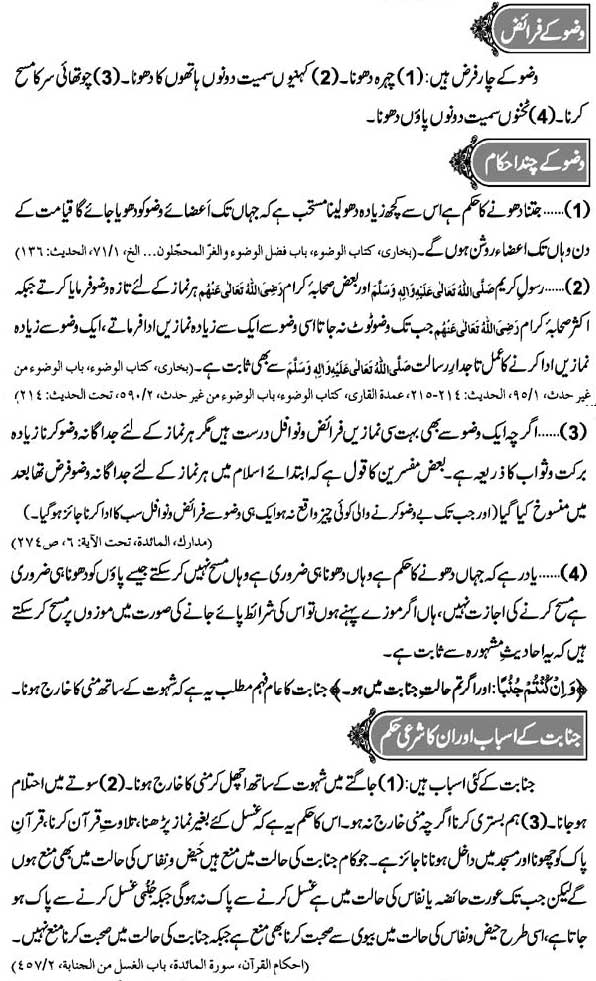
Finding A Worthy Purpose To Devote Our Life For
It has disappointed so many, while also pleased many others. People have died chasing it and people who didn’t chase also died. Its joys and hardships are but temporary delusions.
How many times does it deceive us with its illusions? It can captivate the heart, blind the one besotted by it, and also burden us with worries. It is none other than the Dunya!
“Know that the life of the world is merely a game and a diversion and ostentation, and a cause of boasting among you and trying to outdo one another in wealth and children, like the plant-growth after rain, which delights the cultivators. Then it withers, you see it turning yellow, and then it becomes broken stubble. In the hereafter, there is terrible punishment, but also forgiveness from Allah and His good pleasure. The life of the world is nothing but the enjoyment of delusion.” (Qur’an, 57:20)
If we stop to think about those who are titled “successful” in this world, they are primarily those who have amassed a money. But if you look at the best of worldly pleasures, you know that what is of benefit one day, is harmful the next day. Joys are tainted with grief and our wishes never cease. Death will certainly overtake us though we have many more aspirations remaining.
Allah says: “Yet still you prefer the life of the world, when the hereafter is better and longer lasting.” (Qur’an, 87: 16 -17)
So, why do so many choose to run frantically after this life? Because rewards are seen and experienced on earth. If we perform our duties well, we are promoted or given a pay rise. Imagine if we were told that $10,000 await us every time we do an Umrah, we may try to go everyday, regardless of the hardship.
The reward in the everlasting life cannot be experienced here. For instance, the Prophet (peace be upon him) said if we knew how great the reward for praying in the first row of the Masjid was, we would compete with each other to do that. But let the first row aside, do we even attend the prayer in the Masjid?
Charity is one of the big deeds that will help us in the hereafter. The best charity is the one when we give so discreetly that our left hand doesn’t know what our right hand gives. But when the time for charity comes, our bills suddenly become very important. We get reminded of our rents and other expenditure.
As Muslims, our goal should be the pleasure of Allah. Our destination should be In Sha Allah Paradise. This does not mean we must sit in the Masjid all day. No. Instead, we should make everything we do in this life a means to make us successful in the hereafter.
The world looks up to celebrities as role models. But what happens when they lose their luster? What happens when they become old and weak?
They’re all reduced to a bunch of memories. Of what use one may wonder?! If you ponder and seek guidance from the Qur’an, you will realize that the only thing that truly matters at the end of the day is the way we have lived our lives – how many good deeds we have done and how less sins we have committed. This is the test for which the world has been created.
Hasan Al-Basri, who was a famous Tabi’ee (student of the Sahabah), described the world as being only three days. The day that has passed by and so there is no hope in it.
The day you are living in and so it is proper that you should make the most of it. The day that is to come, about which you don’t know if you will be a part of it.
Dawat-E-Deen


